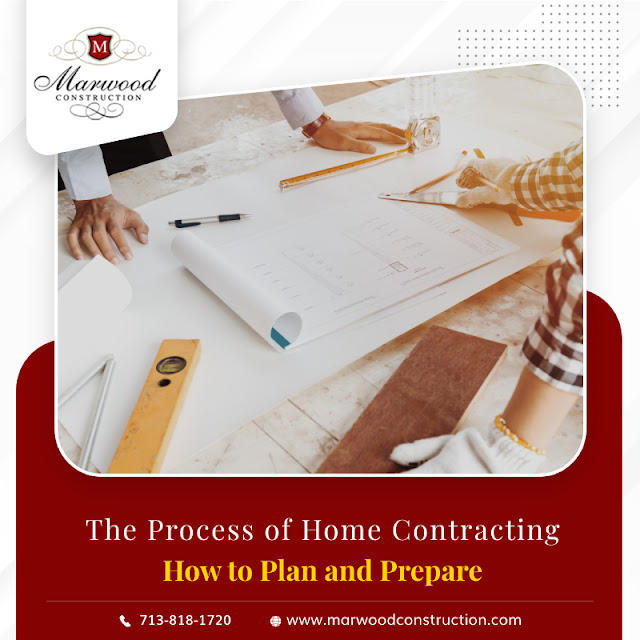How to Plan and Prepare for Home Contracting
Building a home from the groundup or remodeling needs careful planning and preparation and the involvement of a multitude of parties. Since home contracting entails detailed tasks that only seasoned professionals can manage, you need to have your general execution plans chalked out to go about the project beforehand. Remember, the building process does not start the day the crew begins demolition, rather, precedes it by a long margin with a string of required activities. These include making a good plan and hiring a competent professional for remodeling contracting. Let us take you through the steps to build or remodel a home.
How to plan and prepare for home contracting
Building or remodeling a home can be a one-time opportunity due to the huge cost involved. So it must proceed in a meticulous manner including the task of searching and selecting a home contractor. You may also read our detailed blog on the things to know before choosing a home builder.
Planning the budget: Cost is arguably the most important factor to be weighed in before planning for home contracting. Get a realistic idea of the expenditure you shall incur while building or remodeling your home. Planning a budget is all about making a realistic assessment of what you can afford to spend and what would be the actual cost of building. It is possible that you would need a mortgage or loan from a bank or financial institution based on your income and financial obligations.
Even if the banks or financial institutions prequalify you for a mortgage, you need to assess how much money you can spend realistically. Budgeting shall also involves aspects such as expenses towards buying land, construction materials, interior features, home appliances, and hiring professionals (designer or architect and a building contractor.) This can be a time-consuming process where each aspect of construction is considered and the corresponding cost estimated. So, take your time to research the areas and issues before signing a contract with a contractor or builder. Also, consider the following aspects while making a cost estimation for the project.
There are banks who may prequalify you for a mortgage and lend you more than what possibly you can afford. Remember, the sub-prime mortgage crisis of 2008 was caused by similar circumstances. Don’t go for constructing or remodeling a house equivalent to the maximum loan amount the bank or any financial institution approves. It makes sense to keep your mortgage payment amount realistic to your income, consult an independent financial adviser to determine the cost and expenses you can afford. Also, you may view our video to knowhow to add spaces to your existing home without spending a fortune.
Any new home or
remodeling contracting can lead to
cost overruns. This is due to the fact that the cost of materials or appliances
may change midway or you may make some changes to the basic design of the
house. So, build a buffer to cushion you from any unexpected cost overruns or
chances of getting broke.
Also Read - Why Should You Build a New Home with a General Contractor?
Since a bulk of the expenses towards home construction or remodeling is going to be paid to the building contractor - the person responsible for managing all subcontractors and laborers, it is better to choose him or her wisely. For starters, if you have construction documents get three price proposals or bids from builders and compare their quality of work by researching references from people who had their homes or properties built by them. It is important to find a balance between a builder offering affordable remodeling services and the one known to perform quality work using top-quality materials.
Get involved in the purchase of materials by the builder, especially by showing your preferences. The builder will ultimately direct you to suppliers that they have used before and fit your design finish needs. This way you can take some control over the cost and quality of the products you select.
There are going to be several hidden costs involved in the Houston remodeling of your home, which you may not be aware of in the first place. There can be undisclosed costs such as structural dry rot, corroded plumbing pipes and other concealments. Then there can be other expenses, which can take you completely off-guard such as engineering fees, builders’ insurance, lawn care change orders, etc. So, take these expenses into account while planning for the budget of your home.
Choose a location: If you going to build a new home as opposed to home remodeling, the first criteria to focus on would be the location. Talk with realtors and get a rough estimate of the cost of the land in and around your desired living area. Besides looking at options such as a suburban area or an area with an ocean or mountain view, you need to know about the soil condition, zoning laws, building codes, permits, code and development restrictions, water source, slopes, utility lines, and drainage systems. Your cost of construction will rise if the design needs to fit as per the special characteristics of the location. Also, find out if most amenities are located nearby such as markets, educational institutions, and health facilities, among others.
Choose a house plan: May homeowners pick up ideas for home designs either from online sources or printed catalogs. Reach out to a builder, architect, or designer to help you select the best stock plan based on your requirements. The designer or architect may tweak the stock plans to address your needs by making modifications to the window styles, room size, interiors, and other details. No matter what stock plan you choose, it is advisable to have a plan that will meet your requirements for many years. For instance, as a young couple, you may want to make a provision for the addition of more family members or as a senior homeowner, you may want to include provisions for aging needs such as safe stairs, easy open windows, no-slip flooring with a matte finish, or grab bars in the bathroom, etc. An experienced licensed architect or designer may ask relevant questions to custom design your home or remodel it. These questions can be:
l What are your lifestyle and preferences as the same can influence
the heating and cooling costs?
l How do you use the home for entertainment?
l What activities are important to your family and what is keeping you from enjoying them in your home?
Visit our resources section to know details about the planning process for home remodeling contracting.
Select a builder for construction: Once you are done with things such as earmarking a target budget, choosing a location (for new home construction), and selecting some home design ideas, it is time to select a home builder or remodeling contractor. The key players or vendors involved in building or remodeling your home include the material supplier, excavator, carpenters, surveyor, plumber, interior designer, and electrician, among others. A building contractor will ensure you don’t have to deal with individual players but get the work done as per the plan. Choosing the right contracting firm for the job is important as otherwise he or she may end up committing mistakes that will cost you more in modifications later. So, if someone did a good renovation of the bathroom of your neighbor, it is not necessarily that he or she is the right person to remodel your home. The steps to select a builder for Houston remodeling include the following:
Checking of licenses, litigation history, and complaints: It goes without saying that licensed contractors are the best when it comes to hiring the right person. You may seek a copy of the license and the licenses of the subcontractors who are supposed to work on the project. Check the local court records, state disciplinary boards, or business bureau to know about any legitimate litigation history and complaints. After all, it is your dream project and you should not end up giving the contract to a person who has many complaints against his or her name and who is not reliable in the first place.
Check references and online reviews: Reach out to the homeowners to find out if the contractor can be relied upon and meets their commitments (cost and timeline). Look at their work when possible, by visiting them physically and assess the quality of work. If not look at their photo portfolio of work. Read online reviews on sites such as Angie’s List, BBB and Google about the building contractor or his or her company. Although one nasty comment or negative review may not give the right picture, a pattern of such reviews for a long period can be a cause of concern and raise a red flag.
Get all permits: It is a contractor’s job to get all permits related to home construction or renovation. You may come across scenarios where contractors may ask you to arrange such permits on your own, or say these are not needed to save money, or simply not discuss the topic. Remember, this can be a violation of the local ordinances or laws and subject you to penalties later. Also, this would mean the home will not be inspected upon completion by the county or city to ensure the construction complies with the building code and zoning laws. Such non-permitted work can come to haunt you later when you may want to sell your home.
Conclusion
Whether it is
home or commercial contracting, the
above-mentioned steps are essential to do the basic groundwork. Also, look for
things covered by homeowners insurance and contractor’s business insurance to
avoid getting into a soup should some accident or weather event damage your
home under construction or renovation. The process of planning can be lengthy
but will give a clear vision to the project. The detailed planning would mean
everyone involved in the project - the designer, contractor, and you, starts
with an articulated plan. Further, read a blog to know the steps of planning asuccessful building project.




Comments
Post a Comment